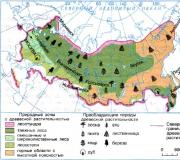Belgorod fortress and service in it. The captain's daughter, what is the Belgorod fortress, the rules established in it
Petrusha Grinev’s father, a retired military man, hardly ever guessed when he sent his son to serve in the Belogorsk fortress that such childish trials would fall to his lot. Little else was known about the popular revolt, about its “meaninglessness and mercilessness.” But the fact that his son should not “hang around and hang out” in St. Petersburg, but “smell gunpowder” was self-evident in his ideas about military service. “Serve faithfully to whom you swear allegiance” - this was his order.
The small garrison where Pyotr Grinev went to serve stood far from the cultural and political centers of Russia. Life here was boring and monotonous, the commandant of the fortress, Captain Mironov, taught the soldiers the intricacies of military service, his wife, Vasilisa Egorovna, delved into everything, managing the fortress as seriously as in her home. Their daughter, Marya Ivanovna Mironova, “a girl of about eighteen, chubby, ruddy, with light brown hair smoothly combed behind her ears,” was the same age as Grinev, and, of course, he immediately fell in love with her. In the house of the commandant, Grinev was received as if he were his own, and from the ease of such service, as well as from being in love, he even began to compose poetry.
Petrusha shared his literary experiences with Alexei Shvabrin, an officer exiled to the Belogorsk fortress from St. Petersburg for a duel. It soon became clear that Shvabrin was also in love with Masha, but was refused. Offended, he slandered Masha Grineva, in the hope that his comrade would doubt her integrity and stop caring for her. But Grinev challenged the slanderer to a duel and was wounded. The commandant's family tenderly nursed the wounded man, and Shvabrin harbored an even greater grudge against Grinev.
One day, this completely peaceful life of the inhabitants of the fortress was disrupted: the siege of the fortress began by rebels led by Pugachev. The forces were clearly unequal and, although Mironov’s soldiers stood to the death with their only cannon, Pugachev conquered the fortress. This is where the character of the inhabitants of the fortress manifested itself: neither the “coward” Masha nor Vasilisa Egorovna agreed to leave Mironov and take refuge in Orenburg. The captain himself, realizing that the garrison was doomed, ordered to shoot back to the end, tried to raise the garrison to attack, to strike at the enemy. This is a brave act of an elderly and quiet man, considering that Pugachev took many fortresses without a fight. Mironov did not recognize the impostor as emperor and accepted death, as befits a Russian officer. Following him, Vasilisa Egorovna died, before her death she called Pugachev a poor convict.
Masha managed to take refuge in the priest’s house, the frightened Shvabrin swore allegiance to Pugachev, and Grinev was preparing to accept death as fearlessly as the Mironovs, but suddenly the false emperor recognized him. Grinev also remembered that night when he and Savelich, on their way to service in the Belogorsk fortress, got caught in a snowstorm and lost their way. They were then led to the inn by a man who came from nowhere, whom he and Savelich conventionally called the counselor. Then, to the man’s displeasure, Grinev gave the counselor a sheepskin coat from the master’s shoulder, because he noticed how lightly he was dressed. Now Pugachev recognized Grinev and, in gratitude, let him go.
Shvabrin captured Marya Ivanovna, forcing her to surrender to him. She managed to deliver the letter to Grinev and he rushed to help her out. Pugachev again showed generosity and freed the girl. He did not change his decision even after learning that this girl was the daughter of the rebellious commandant of the Belogorsk fortress. Seeing Grinev off, he almost admitted that he was an impostor and did not believe in the happy outcome of his venture.
Thus ended the seemingly serene life of the inhabitants of the Belogorsk fortress. The usual course of events was changed by its sudden siege. Extreme events revealed the characters of its inhabitants.
Visually imagine the picture that is contained in just one phrase: “The river has not yet frozen, and its lead waves sadly blackened in the monotonous banks covered with white snow.” Describe the epithets used here.
Leaden waves create a sharp contrast with the white shores covered with snow. Before us is a landscape of the beginning of winter, depicted graphically. It is very reminiscent of an engraving, and its outline creates an unsettling mood. Not only do the colors of the beginning of winter appear before the viewer, but a certain mood is also created. Thus, the epithet lead conveys the heavy movement of freezing water.
Carefully read the description of the Belogorsk fortress and compare it with the imaginary fortress that Petrusha expected to see. How could the idea of a mighty fortress form in the minds of a minor?
Petrusha read little, but even in the fairy tales that he could hear from his mothers and nannies, there were fairy-tale palaces and impregnable fortresses. They are always depicted in our minds as mighty, made of powerful stones and with their walls and towers stretching upward. It’s worth imagining such a fortress for a moment, and then rereading the description of the poor and neglected structure that the Belogorsk fortress was. At the same time, you will immediately feel the strength of the disappointment that should have gripped Petrusha.
Describe the first appearance of the new officer at the commandant of the fortress. With what feeling does the narrator describe this scene? How is this description related to the second epigraph of the chapter (“Old people, my father”)? Let us remember that these are words from “The Minor” by D. I. Fonvizin. Who says this phrase in a comedy?
Let's not forget that the story is narrated from the perspective of Pyotr Grinev, who has matured and remembers his youth. The scene of Petrusha’s appearance at the commandant of the Belogorsk fortress is described with a feeling of sympathy and a slight smile from the elder over the naive ignorant who found himself in a new situation. The simplicity and patriarchal nature of the life of the inhabitants of the fortress evokes affection and helps to immediately appreciate the new participants in the events of the story. These are truly “old people”. But such a definition in no way detracts from their dignity. The patriarchal nature of everyday life and the strict adherence to customs only support the atmosphere of sympathy that arises when reading.
There is no irony in the epigraph to the chapter. Let us remind you that these are the words of Mrs. Prostakova from the comedy “The Minor” (act three, scene V).
Give portraits of those “old people” whom Grinev recognized in the Belogorsk fortress.
The story about the people whom Pyotr Grinev recognized in the Belogorsk fortress can be told in the order of their appearance on the pages of the chapter. The first was an “old invalid” who, sitting on a table, sewed a patch onto the elbow of his green uniform. He immediately said to the newcomer: “Enter, father, our houses.”
The “old lady in a padded jacket,” who, together with the “crooked old man in an officer’s uniform,” was unwinding the threads, was Vasilisa Egorovna, the wife of the commandant, the main person in this provincial little world.
She tells Grinev about Shvabrin and summons the constable Maksimych, a young and stately Cossack.
Grinev gets used to his new surroundings. It becomes obvious to the reader that the relationships of people in the Belogorsk fortress are completely determined by the words from “The Minor.”
Those who wish can prepare a story - a genre sketch of the life of the Belogorsk fortress in peacetime.
The story about the peaceful course of life in the Belogorsk fortress may well coincide with the retelling of Chapter III “Fortress”. It is worth talking about the very modest strengthening, the patriarchal nature of life, and the inextricable connection with official decisions, which are still made in peacetime, about how the military service goes. You can introduce into this story, for example, a description of how the hut was chosen for Grinev’s residence. “Take Pyotr Andreich to Semyon Kuzov. He, a swindler, let his horse into my garden.” This is the motive for the newly arrived officer to stay.
Carefully read the brief description of the landscape opening from the window of Semyon Kuzov’s hut, where Grinev was assigned to billet. What role does this description play in the chapter?
The place where Grinev was assigned to live was located at the very edge of the fortress, on the high bank of the river. “The sad steppe stretched out before me. Several huts stood diagonally; There were several chickens wandering around the street. The old woman, standing on the porch with a trough, called to the pigs, who answered her with a friendly grunt.” This description prepared the reader to understand the state of the young officer: “And this is the direction in which I was condemned to spend my youth!”
Alexander Sergeevich Pushkin, the great Russian poet, wrote not only poetic but also prosaic works, especially at the end of his creative career. Pushkin's prose reaches its utmost perfection in his last major work - the historical story "The Captain's Daughter." Pushkin deeply and carefully studies the era of the Pugachev uprising using archival materials, traveling to the scene of the novel - in the Volga region, in the Orenburg steppes, where the living memory of the leader of the popular movement is still preserved. According to V. O. Klyuchevsky, in “The Captain’s Daughter,” which is based on a thorough study of historical sources and is distinguished by its enormous power of generalization, “there is more history than in “The History of the Pugachev Rebellion.”
The Belogorsk fortress, in which young Grinev was to serve, was located “forty miles from Orenburg” and was a village surrounded by a log fence. At the gate, Grinev saw “a cast-iron cannon; the streets were cramped and crooked; the huts were low and mostly covered with straw.” The commandant himself lived in a simple wooden house, built on a high place near a wooden church.
The first meeting with the commandant made an extraordinary impression on the young man: he was “a cheerful and tall old man, in a cap and a Chinese robe,” he commanded twenty “old disabled people” lined up “in front.” Less than a few weeks had passed before Grinev’s life in the Belogorsk fortress became for him “not only bearable, but even pleasant.” In the commandant’s house he “was received like family”; Ivan Kuzmich and his wife were “the most respectable people.” The commandant became an officer “from soldiers’ children”; he was a simple man, poorly educated, but “honest and kind.” Mironov zealously fulfilled his duty, serving the empress and punishing her enemies. In the face of death, he showed extraordinary courage.
Vasilisa Egorovna, a simple and hospitable woman, met Pyotr Grinev in the fortress as if she had known him for “a century.” She “looked at the affairs of the service as if they were her master’s, and ruled the fortress as accurately as she ruled her house.” For twenty years she and her husband lived in this fortress. She was accustomed to the military way of life, exposed to dangers, and even in the terrible days of the Pugachev Troubles, she did not leave her husband and was not afraid to share his fate.
Marya Ivanovna, the daughter of Captain Mironov, lived in the fortress with her parents. Since childhood, she was accustomed to such a life, but, despite the soldier’s environment, she grew up to be a subtle, sensitive girl. An independent mind, courage, the ability to have deep, sincere feelings, and loyalty to one’s word are the main character traits of Masha Mironova. For the sake of love and friendship, she is capable of true heroism. Everyone who knows her likes her; Savelich calls her “an angel of God.”
An old servant of the Grinevs, Savelich is the personification of a bright national character. He is characterized by truthfulness, good nature, courage, and human dignity. He selflessly serves his masters, all his desires, feelings and thoughts are subordinate to his masters. He looks at everything through the eyes of his masters, and therefore Pugachev for him, a common man, is a villain and a swindler.
The fortress was inhabited by people of a different kind, opposed to the “old guard”.
Officer Shvabrin is a representative of a noble family. This is a typical brilliant guards officer, a rich nobleman, not devoid of intelligence, but who received a superficial education. He is spoiled, accustomed to the fact that all his desires are fulfilled. In addition, Shvabrin is an envious person, a coward and an arrogant egoist, who became a supporter of Pugachev, not for ideological, but for selfish reasons.
In the images of the inhabitants of the Belogorsk fortress, the author seeks to convey to readers his idea that the “indigenous” nobility, who did so much in creating the Russian state, pushed away from power, disillusioned, retains the best class properties, and the “new nobility” in the person of Shvabrin , which has acquired political and economic power, is devoid of nobility, conscience, honor and love for the motherland.
On the pages of the story “The Captain's Daughter” A. Pushkin manages with great skill not only to depict the historical events of the 1770s associated with the Pugachev uprising, but also to show the diversity and versatility of the characters and destinies of the inhabitants of the Belogorsk fortress - a cramped and closed world.
We meet the commandant of the fortress, Ivan Kuzmich Mironov, and his wife. These are experienced people who have seen a lot during their long lives and managed to carry through the vicissitudes of fate a feeling of love and respect for each other, loyalty to their duty. In everyday life they are simple, kind and caring. However, in critical situations other qualities of their character appear - courage, determination, inflexibility. So, Ivan Kuzmich refuses to swear allegiance to the rebel Pugachev, although he understands that this threatens death. His fate is shared by Vasilisa Egorovna, who did not want to leave her husband in difficult times.
Masha Mironova harmoniously combines tenderness, sensitivity and prudence with pride, courage and sacrifice. She was not afraid to refuse Shvabrin’s advances, although she was completely in his power. Showing unprecedented courage, Masha went to St. Petersburg to protect her beloved and managed to convince the empress of his innocence.
Petr Grinev cannot leave the reader indifferent either. A representative of the nobility, he seems to have absorbed all the best qualities of this class: valor, courage, justice, honesty, love for the motherland and the ability to keep one’s word. With sincerity and decency, he managed not only to win the love of Marya Ivanovna, but also to win over Pugachev. The ability to overcome obstacles with honor is a characteristic feature of Grinev.
Completely opposite feelings arise in relation to Shvabrin. This is a cowardly, vile, envious and jealous person. In order to achieve his goal, he is capable of betrayal and various abominations.
I believe that all the inhabitants of the Belogorsk fortress, except Shvabrin, can serve as role models in our time.
(No ratings yet)
Other writings:
- Alexander Sergeevich Pushkin, the great Russian poet, wrote not only poetic but also prosaic works, especially at the end of his creative career. Pushkin’s prose reaches its utmost perfection in his last major work, the historical story “The Captain’s Daughter.” Deeply and carefully based on archival Read More......
- The story by A. S. Pushkin “The Captain's Daughter” (1836) is based on real historical events. It describes the uprising of Emelyan Pugachev. The narration in this work is told on behalf of the nobleman Pyotr Grinev. The main part of “The Captain's Daughter” is occupied by a description of the hero’s life in the Belogorsk fortress, where Read More ......
- Belogorsk fortress in the life of Pyotr Grinev (based on the novel by A. S. Pushkin “The Captain’s Daughter”) A. S. Pushkin’s novel “The Captain’s Daughter” tells about the peasant uprising led by Emelyan Pugachev. We can say that all the main events of the work take place in one place - in Read More......
- The Belogorsk fortress was located far from the cultural and political centers of that time, but the wave of Pugachev’s rebellion reached it too. The small garrison faced an unequal battle. The fortress fell. Emelyan Pugachev carries out his “imperial” trial, that is, he mercilessly deals with unarmed people. It is this Read More......
- Pyotr Grinev is the son of a nobleman, so in his service he always strived first and foremost to fulfill his official duty. During the defense of the Belogorsk fortress, the hero proved himself to be a brave officer who honestly fulfilled his duties. At Pugachev’s offer to enter his service, Grinev Read More......
- The most romantic image of the story is the image of the daughter of the commandant of the Belogorsk fortress, Masha Mironova. Kindness, conscience, spiritual generosity - these are the main qualities that we see in this heroine. Masha grew up and matured next to her modest and kind parents, within the walls of Belogorskaya Read More ......
- Grinev and Shvabrin are two different personalities. But there is something in common between them. Both are young, both officers, both nobles. As a child, Grinev played leapfrog with the yard boys. The father refused to send his young son to serve in St. Petersburg, but wrote a letter to his Read More......
- The story “The Captain's Daughter” is written in the form of memoirs of the main character, Pyotr Grinev. Petrusha’s childhood was free and easy; he “lived as a small child, chasing pigeons and playing leapfrog with the yard boys.” But upon reaching the age of sixteen, his father decides to send Peter to Read More......
School essay
Alexander Sergeevich Pushkin, the great Russian poet, wrote not only poetic but also prosaic works, especially at the end of his creative career. Pushkin's prose reaches its utmost perfection in his last major work - the historical story "The Captain's Daughter." Pushkin deeply and carefully studies the era of the Pugachev uprising using archival materials, traveling to the scene of the novel - in the Volga region, in the Orenburg steppes, where the living memory of the leader of the popular movement is still preserved. According to V. O. Klyuchevsky, in “The Captain’s Daughter,” which is based on a thorough study of historical sources and is distinguished by its enormous power of generalization, “there is more history than in “The History of the Pugachev Rebellion.”
The Belogorsk fortress, in which young Grinev was to serve, was located “forty miles from Orenburg” and was a village surrounded by a log fence. At the gate, Grinev saw “a cast-iron cannon; the streets were cramped and crooked; the huts were low and mostly covered with straw.” The commandant himself lived in a simple wooden house, built on a high place near a wooden church.
The first meeting with the commandant made an extraordinary impression on the young man: he was “a cheerful and tall old man, in a cap and a Chinese robe,” he commanded twenty “old disabled people” lined up “in front.” Less than a few weeks had passed before Grinev’s life in the Belogorsk fortress became for him “not only bearable, but even pleasant.” In the commandant’s house he “was received like family”; Ivan Kuzmich and his wife were “the most respectable people.” The commandant became an officer “from soldiers’ children”; he was a simple man, poorly educated, but “honest and kind.” Mironov zealously fulfilled his duty, serving the empress and punishing her enemies. In the face of death, he showed extraordinary courage.
Vasilisa Egorovna, a simple and hospitable woman, met Pyotr Grinev in the fortress as if she had known him for “a century.” She “looked at the affairs of the service as if they were her master’s, and ruled the fortress as accurately as she ruled her house.” For twenty years she and her husband lived in this fortress. She was accustomed to the military way of life, exposed to dangers, and even in the terrible days of the Pugachev Troubles, she did not leave her husband and was not afraid to share his fate.
Marya Ivanovna, the daughter of Captain Mironov, lived in the fortress with her parents. Since childhood, she was accustomed to such a life, but, despite the soldier’s environment, she grew up to be a subtle, sensitive girl. An independent mind, courage, the ability to have deep, sincere feelings, and loyalty to one’s word are the main character traits of Masha Mironova. For the sake of love and friendship, she is capable of true heroism. Everyone who knows her likes her; Savelich calls her “an angel of God.”
An old servant of the Grinevs, Savelich is the personification of a bright national character. He is characterized by truthfulness, good nature, courage, and human dignity. He selflessly serves his masters, all his desires, feelings and thoughts are subordinate to his masters. He looks at everything through the eyes of his masters, and therefore Pugachev for him, a common man, is a villain and a swindler.
The fortress was inhabited by people of a different kind, opposed to the “old guard”.
Officer Shvabrin is a representative of a noble family. This is a typical brilliant guards officer, a rich nobleman, not devoid of intelligence, but who received a superficial education. He is spoiled, accustomed to the fact that all his desires are fulfilled. In addition, Shvabrin is an envious person, a coward and an arrogant egoist, who became a supporter of Pugachev, not for ideological, but for selfish reasons.
In the images of the inhabitants of the Belogorsk fortress, the author seeks to convey to readers his idea that the “indigenous” nobility, who did so much in creating the Russian state, pushed away from power, disillusioned, retains the best class properties, and the “new nobility” in the person of Shvabrin , which has acquired political and economic power, is devoid of nobility, conscience, honor and love for the motherland.




